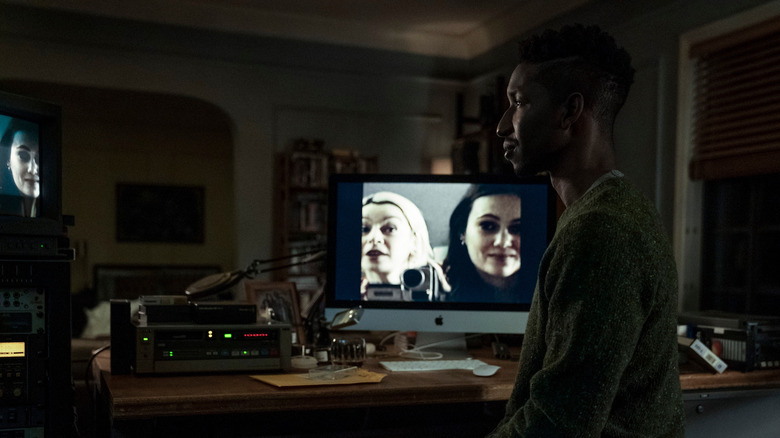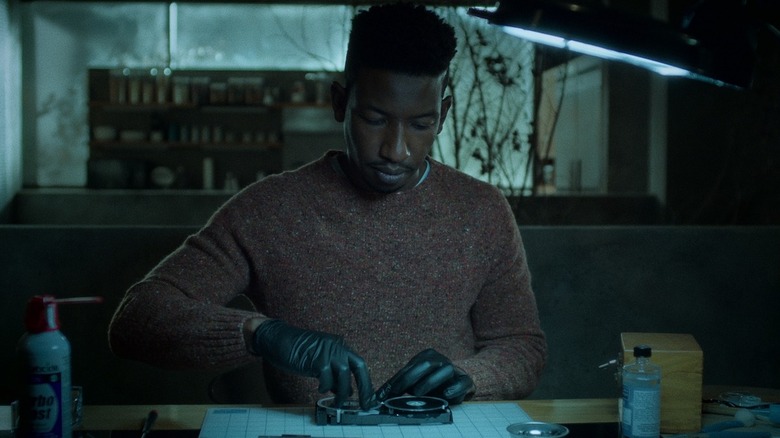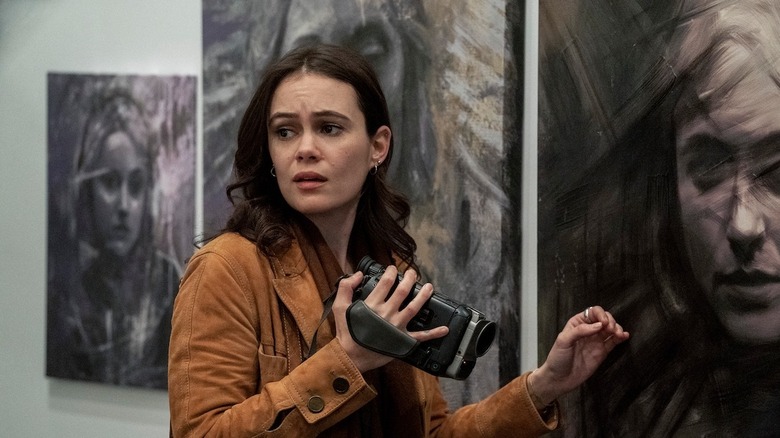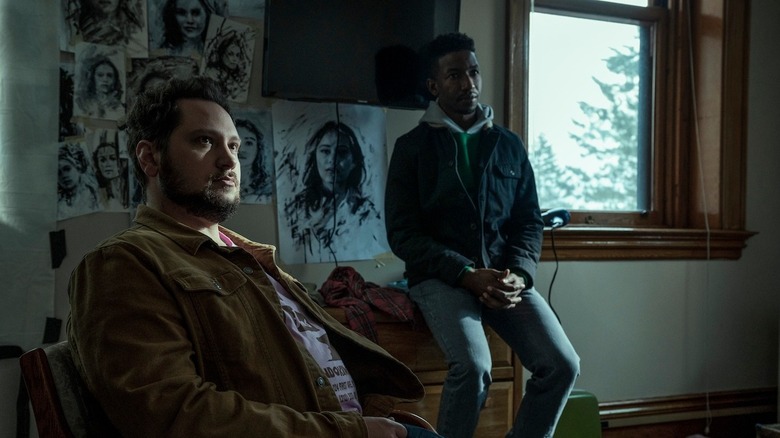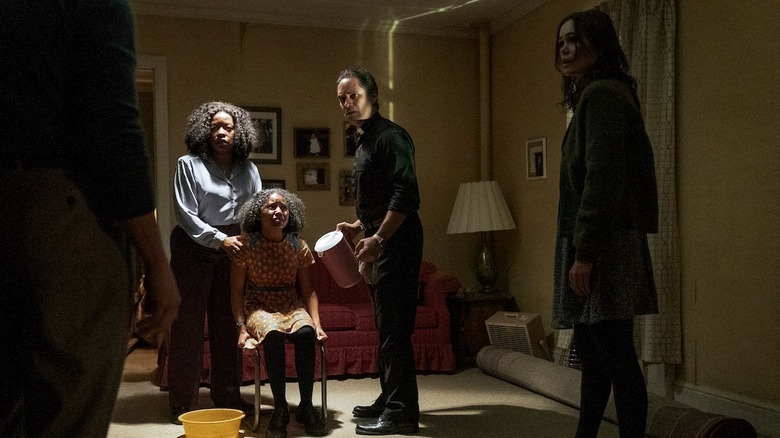Archive 81 Review: Analog Horrors Haunt Netflix's Uneven New Supernatural Series
Analog horror has slowly become a neat little sub-genre; tales of terrors that usually spring forth via some antiquated, outdated, pre-digital tech. Usually, this old tech is cursed in some way — think of the VHS tape that causes certain doom in "The Ring." Or the device in use accidentally summons the forces of darkness — à la the reel-to-reel tape recorder that plays back dark incantations in "The Evil Dead."
It is the inverse of the "tampered in god's domain" trope that is also prevalent in horror and sci-fi, especially titles that sprung forth during the nuclear age: the idea that learned characters tinkering with new, never-before-seen tech will unleash something unspeakable.
The devices of analog horror are not unknown. They are familiar. And that's part of their horrifying power. We may not use these things anymore, but we know them, or know of them. They are out-of-date; almost forgotten; gathering dust. They have become our modern-day equivalent of ancient runes, or curses written in dead languages in blood across paper stretched from human skin. The VHS tape, the audio cassette tape, any pre-digital device, honestly, has become a thing we've forgotten. But sometimes, the things we intentionally forget come back to haunt us.
A Pastiche
That's the fun of analog horror. That VHS tape — a chunk of black plastic collecting dust in a water-damaged cardboard box in a dead relative's garage — may seem harmless, but who knows what unspeakable horrors it contains? And god help you if you have a projector and a few mysteriously labeled film canisters just sitting around in the attic of your new house.
I'm a sucker for this sort of stuff. Give me a story about a cursed object — be it a videotape or a paperback book — and I'm interested. So I was almost immediately in the tank for Netflix's creepy new series "Archive 81," which the streaming giant touts as "loosely inspired by the popular podcast of the same name." Rebecca Sonnenshine ("The Boys") is showrunner on the series, which boasts episodes directed by indie horror specialists Justin Benson and Aaron Moorhead.
"Archive 81" feels like the brainchild of people who grew up in the age of video stores. The era where you could wander into the dusty, poorly-lit sections of those stores and browse the glossy, garish box art, searching for something that could make your blood run cold. The contents therein rarely lived up to the shiny ghoulishness splashed across the box, but the thrill of it all was in the experience; the hunt; the quest. It was like solving a puzzle ... or a mystery.
On top of that, "Archive 81" is a pastiche; an amalgamation of its horrific ancestors, "The Ring," "Pulse," "In the Mouth of Madness," "Sinister," "Rosemary's Baby," and about a billion different found-footage fright flicks.
Check the Tapes
None of this is to say the show is a smashing success. But there's a sort of spooky charm to be had in the series' devotion to piecing together paraphernalia and trying to find some sanity buried beneath madness. In 1994, the Visser apartment building burned down, claiming several lives in the process. A series of badly burned, but still salvageable, video camera tapes were found at the scene. Now, in the present day, film archivist Dan Turner (Mamoudou Athie) has been hired to piece them together and restore their footage.
The tapes were recorded by film student Melody Pendras (Dina Shihabi), who took up residency in the Visser under the pretense of making a film about the history of the building. But Melody has ulterior motives for being in the building, and almost immediately, she realizes there's something off about this place. Like the sprawling, Gothic Bramford apartment building in Roman Polanski's "Rosemary's Baby," or the cursed brownstone in Michael Winner's "The Sentinel," the Visser holds plenty of secrets, and its residents all seem a little abnormal and even hostile at times.
Dan's employer, a shady billionaire (is there any other kind?) played by Martin Donovan — who is doing so much with so little, making his character seem threatening with a simple raised eyebrow or slight smirk — invites him to work at a state-of-the-art, very secluded facility, and Dan takes the gig because he's curious. But the more he digs into the footage, the more questions arise — and the more disturbed Dan becomes. Because he discovers he has an unexpected connection to what's happening in Melody's movie.
An Unknowable Mystery
This scenario allows "Archive 81" to cut back and forth between past and present, and here is where the series falters. The sections with Dan piecing together the footage are captivating, which is no small feat. These sequences primarily consist of us watching Dan work, and that could've backfired in boredom. But there's a thrill to be had in the hunt; in following Dan as he does his job, and does it well — only to be horrified at the results.
Athie's performance is the key ingredient here, and the actor delivers an intense, occasionally frantic performance as he tumbles down the analog rabbit hole. Athie has a remarkable voice — deep and crystal clear, with a unique cadence and rhythm that can often be quite hypnotic.
Yet, curiously, the footage itself is lacking. This feels paradoxical; if we're so invested in Dan's investigation, shouldn't we also be interested in what he's uncovering? You'd think so, but "Archive 81" falters anytime it cuts back to the '90s. There's strange cult activity going on at the Visser, coupled with some sort of mysterious mold that may or may not drive people insane. But Melody makes for a rather bland protagonist, and Shihabi's performance isn't helping matters.
If Athie's voice is one of his greatest assets, Shihabi's voice is a hindrance; she delivers all of her lines as if they ended with a series of question marks. Sure, Melody is asking a lot of questions as she tries to figure out what's going on at the Visser. But even when she's not inquiring about anything, her line readings still have that questionable feel. It's distracting to the point that I found myself wishing the majority of the show had stayed put with Dan in the present and left the '90s material more of an unknowable mystery.
Elemental Vibrations
Perhaps that's the real miscalculation here. "Archive 81" feels too eager to actually provide concrete answers, when its material would be better served by a certain ambiguity. These issues aren't enough to completely derail the show, but they certainly don't help matters. Those who crave this subgenre, though, will find much to love here. The meticulous crafting of the show, from its scenes of characters bathed in the eerie blue light of a TV screen, to its locked and impenetrable rooms, conjures up near-elemental vibrations that linger like bad dreams. Fans of the gone-too-soon, creepypasta-inspired "Channel Zero" will especially find much to grasp onto here.
Like I said: the very premise of the show, with its embracement of analog nightmares — piecing together VHS tape, pouring over the pages of insane notebooks, getting lost in the white noise of TV static — is often hard to resist. You give me a story about haunted videotapes and you'll get me through the door. But you'll have to keep holding that attention to keep me from turning around and walking right back out the way I came in. Like the glory days of hunting the horror section of a video store, the contents of "Archive 81" never quite match the sick thrill of the splashy box art.
Archive 81 premieres globally on Netflix on January 14, 2022.
